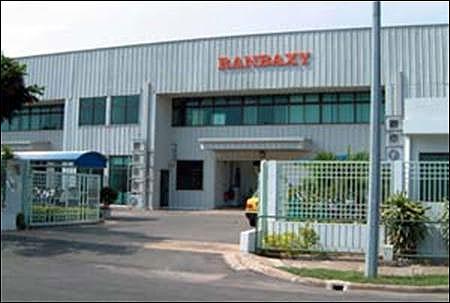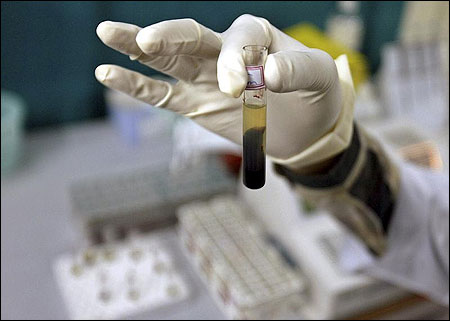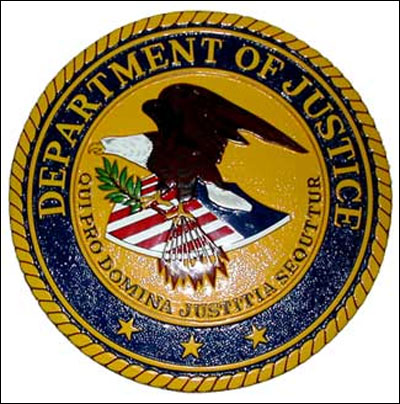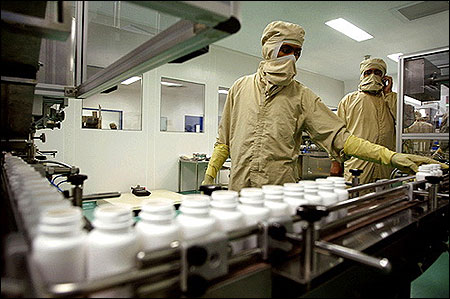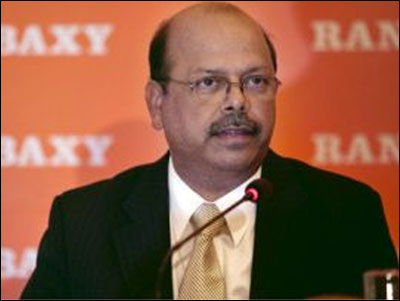 | « Back to article | Print this article |
Major blow to Ranbaxy's American dream
Less than three months after roaring into us market with generic for cholesterol-reducing Lipitor, Dept of Justice files for permanent injunction against Ranbaxy.
Less than three months after roaring into the US market with the generic for the cholesterol-reducing Lipitor (Atorvastatin) after the pharmaceutical giant Pfizer's patent expired, the US Department of Justice has filed a consent decree for permanent injunction against the leading Indian drug manufacturer Ranbaxy Laboratories Ltd, which also had several other generic drugs in the American market.
Delivering a major body blow to Ranbaxy, which with the generic for Lipitor and other drugs was poised to enter the US market with a bang and capture a hefty slice of the generic drugs pie, the Justice Department filed the consent decree against Ranbaxy in the US District Court for the District of Maryland, which it said it had done at the request of the Food and Drug Administration.
Explaining the reasons for its action, the DOJ said that through investigation by the department and the FDA, "the government uncovered numerous problems with Ranbaxy's drug manufacturing and testing in India and at facilities owned by its US subsidiary, Ranbaxy Inc."
"These problems include failure to keep written records showing that drugs had been manufactured properly; failure to investigate evidence indicating that drugs did not meet their specifications; failure to adequately separate the manufacture of penicillin drugs from non-penicillin drugs in order to prevent cross-contamination; failure to have adequate procedures to prevent contamination of sterile drugs; and inadequate testing of drugs to ensure that they kept their strength and effectiveness until their expiration date," it said.
Click on NEXT for more...
Click here for Rediff Realtime News!
Major blow to Ranbaxy's American dream
The DOJ said, the government had "also determined that Ranbaxy submitted false data in drug applications to the FDA, including the backdating of tests and the submitting of test data for which no test samples existed."
"All of these actions constituted violations of the federal Food, Drug and Cosmetic Act, making many of Ranbaxy's drugs adulterated, potentially unsafe and illegal to sell in the United States," it added.
Tony West, Assistant Attorney General for the Justice Department's Civil Division, said, "This action against Ranbaxy is groundbreaking in its international reach - it requires the company to make fundamental changes to its plants in both the United States and India."
"Our commitment to ensuring that the drugs the American people rely on are safe, effective and manufactured according to the FDA's standards extends beyond our borders," he said.
The consent decree filed on January 25, is unprecedented in its scope, and requires Ranbaxy to take a wide range of actions to correct its violations and ensure that they do not happen again.
Among other things, the consent decree prevents Ranbaxy from manufacturing drugs for the US market at certain of its facilities until those facilities can do so according to US standards.
Click on NEXT for more...
Major blow to Ranbaxy's American dream
Also in order to remove false data contained in Ranbaxy's past drug applications and to prevent Ranbaxy from submitting false data to FDA in the future, the consent decree requires Ranbaxy to take actions such as: hire an outside expert to conduct a thorough internal review at the affected facilities and to audit applications containing data from those facilities; withdraw any applications found to contain false data; set up a separate office of data reliability within Ranbaxy; and hire an outside auditor to audit the affected facilities in the future.
Once the consent decree is approved by the court, it becomes a court order with which Ranbaxy must comply or face contempt.
West said, "Submitting false data to the FDA in drug applications will not be tolerated." The Department of Justice, in partnership with the FDA, will use all available tools, including civil injunction actions and consent decrees, to ensure the integrity of drug applications, and to ensure that all drugs sold in the US meet the country's standards."
Echoing West's sentiments, Rod J Rosenstein, US Attorney for the District of Maryland said, "American consumers rely upon the FDA to regulate pharmaceutical drugs, and the FDA relies upon manufacturers to comply with federal standards and provide truthful information."
Analysts were of the opinion that even if Ranbaxy cleans up its act and takes all of the required actions to correct these alleged violations it would have to launch a multi-million public relations campaign to get back in the reckoning to compete for the generic drug market in the US.
Click on NEXT for more...
Major blow to Ranbaxy's American dream
According to these analysts, even if Ranbaxy successfully either fought off these violations in court or took remedial measures to not repeat these alleged violations, the FDA in future would be stringent in approving any of the company's drugs for sale in the US market.
They also noted that Ranbaxy would be hard pressed to erase the fears and suspicions in the minds of consumers and patients, not to mention physicians prescribing the company's generics and health insurance companies picking up the tab, because of lingering doubts, which these analysts predicted would be reinforced by the likes of Pfizer and other pharmaceutical giants who have always argued that generics not only have the desired effects as the brand named drugs, but are also potentially dangerous.
Over three years ago, Ranbaxy, which derives almost 25 percent of its annual revenues from the US market, took a major hit on its earnings when the FDA blocked the sale of 30 generic drugs from its portfolio of 130 medicines that it retails in the US - the world's largest drug market.
At the time Ranbaxy's stocks crashed following the FDA's decision from about $10.5 to $7.9 losing over 20 per cent in just four trading sessions since the loss of revenue at the time was estimated at over $40 million even conservatively, which JP Morgan put at nearly 15 per cent of the company's sales.
"The import alert possibly means loss of sales for Ranbaxy in the North American market and, more importantly, given the string of exclusivity launches in the US, we believe this is clearly negative," JPMorgan analysts wrote in a note at the time.
Click on NEXT for more...
Major blow to Ranbaxy's American dream
Ranbaxy, at the time clearly shaken by the FDA action, which threatened it's then almost $500 million in annual sales in the US market, retained the services of former New York City Mayor Rudy Giuliani and his firm Giuliani Partners to lobby on its behalf review compliance issues related to the FDA action.
The action taken this time around by the FDA against Ranbaxy is considered much more ominous because the last time around the FDA had said the manufacturing process was flawed but that the drugs themselves were not defective and had not warned patients from not taking the medication and urged them to continue taking them.
At the time the FDA said, "These actions are proactive measures that the FDA is taking in order to assure that all drugs that reach the American public are manufactured according to requirements. While this action does not involve removing products from the market, FDA has no evidence to date that Ranbaxy has shipped defective products. We will continue to monitor the situation,' the FDA statement said.
Click on NEXT for more...
Major blow to Ranbaxy's American dream
Following Wednesday's action by the US Justice Department, Ranbaxy announced that the consent decree it had signed on December 20, 2011 with the FDA, which is subject to approved by the US District Court for the District of Maryland, Ranbaxy had committed to "further strengthen procedures and policies to ensure data integrity and to comply with current good manufacturing practices."
In a statement from its offices in Gurgaon, Arun Sawhney, Ranbaxy CEO and Managing Director said, "Today's announcement is the next step in the process of finalizing our agreement with the FDA to resolve this legacy issue."
"We are pleased with the progress we have made in upgrading and enhancing the quality of our business and manufacturing processes and remain committed to ensuring that all of our facilities and products meet the high standards that patients, prescribers and the public have come to expect from Ranbaxy," he said.
Sawhney said, "As one of the premier global generic pharmaceutical companies, all of our efforts are focused on continuing to provide safe, effective and affordable products to consumers around the world."
